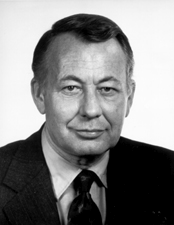(1924-2013) served as a U.S. Representative and a U. S. Senator from Maine. Born in Cambridge, Middlesex County, Massachusetts, February 21, 1924; he attended Boston public schools.
Hathaway served in the United States Army Air Corps 1942-1946. He enlisted as a private, was discharged as a captain and was shot down over Romania and held a prisoner of war for three months. He accompanied President Bill Clinton to Europe for the 50th anniversary of the D-Day invasion. He was awarded the Purple Heart and the Distinguished Flying Cross, and was achieved the rank captain in the Army Air Forces. His wife Mary was an Army nurse during World War II.
He graduated Harvard College 1949, and Harvard Law School 1953 and was admitted to the bar in 1953, beginning the practice of law in Lewiston. Assistant county attorney for Androscoggin County from 1955 to 1957, he served as a hearing examiner for the State Liquor Commission 1957-1961.
A resident of Auburn, he was elected as a Democrat to the Eighty-ninth Congress and reelected to the three succeeding Congresses (January 3, 1965-January 3, 1973). Hathaway was not a candidate for reelection, choosing instead to run for a Senate seat. He was elected in 1972 to the United States Senate unseating Margaret Chase Smith, and served from January 3, 1973, to January 2, 1979, but was an unsuccessful candidate for reelection in 1978, losing to William S. Cohen. He resumed the practice of law in Washington, DC and was a resident of McLean, Va.
As a member of Congress, Hathaway was a strong proponent of the Dickey-Lincoln public power proposal for Aroostook county.
According to the New York Times, “In 1973, he joined two other Democrats, Thomas F. Eagleton of Missouri and Gaylord Nelson of Wisconsin, as the only senators to oppose Nixon’s nomination of Representative Gerald R. Ford, the Republican House leader, to be vice president. He said he was concerned that the country would eventually have as its president a man appointed by a president under the cloud of possible impeachment — which is what happened.”
Legislation he introduced led to the admission of women at West Point and other military academies in 1976. Future governor and U.S. Senator Angus S. King, Jr. served on Hathaway’s Senate staff and remained friends thereafter.
In 1992, Hathaway served on the Maine Blue Ribbon Commission to Examine Alternatives to the Workers’ Compensation System, which issued a report in that year.
He died June 24, 2013 at age 89 at his home in McLean, Virginia.
Additional resources
Martin, Douglas. “William Hathaway, Senator From Maine, Dies at 89.” New York Times. June 25, 2013.
Hathaway, William Dodd. Papers 1965-1979. Orono, Maine. (University of Maine. Fogler Library. Special Collections.)
Hathaway, William Dodd. Canada-United States Interparliamentary Group: report on the eighteenth meeting, held at Victoria, British Columbia, May 27-31, 1977. Washington, DC. U.S. Government Printing Office. 1977. (University of Maine. Fogler Library. Special Collections.)
Miller, Kevin. “Former Sen. Bill Hathaway fondly remembered in state.” Portland Press Herald. June 25, 2013. pp. A1, A8.
Pullen, Dale. William D. Hathaway, Democratic Representative from Maine. Washington, D. C. Grossman, 1972.





